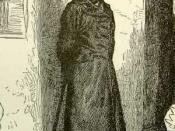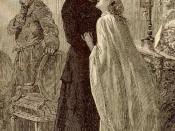In Hugo's novel Les Miserables, Hugo shows us the underlying theme through many different symbols and quotations. For instance, when Jean Valjean stays the night with the bishop Monseigneur Myriel, Valjean steals the bishop's silver. The police catch him and bring him back to the bishop. The bishop hands him two candlesticks, the last of his possessions, and sais, 'Don't forget that you promised me to use this silver to become an honest man.' This quotation sets the stage for the entire novel.
The quote is the bishop's way of saying 'You need to change.' Before Valjean changes, though, he must see the evil in himself. The overall meaning is that a man must see that he is doing wrong and what he has done before he can change. Changing is hard for a person if he cannot see what he is doing wrong.
The quote is a perfect start for this novel of underlying plots.
The first objective of the book is for Jean Valjean to change his lifestyle. Once the bishop tells him this inspiring quote, he moves on and sees the folly of his ways when he takes the coin from Little Gervais. After this immediate change becomes evident, Valjean is shown as a 'Christ figure' through the rest of the book. Other characters are changed but only toward the end of the book. Thenardier is shown as an evil man throughout the book, but it is at the end where he contributes to the apotheosis of the good; this is the law of life as God planned it. Javert acts like a robot, deciding always according to the letter of the law and not its spirit, but in the long run his strength proves spiritual weakness, until the end of the book. At the winding...


